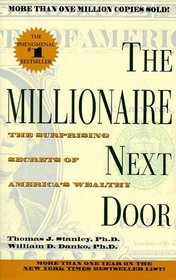Helpful Score: 7
This book was written by and for people that enjoy referencing statistics, tables, and case scenarios. I am not one of those people. This book was terribly boring and a pain to read. However, once you wade through the tediousness, the book contains useful information on obtaining wealth.
The Millionaire Next Door:
1. They live well below their means.
They are extremely frugal- from their house to their cars to their clothes.
2. They allocate their time, energy and money efficiently, in ways conducive to building wealth.
They take the time to plan and control their yearly financial expenditures as well as their investments.
3. They believe that financial independence is more important than displaying high social status.
They believe if they purchase the multi- million dollar mansion in an affluent neighborhood that they have to buy the luxury foreign cars for the garage, the dues for the country club, the private school tuition, the designer suit and watch- essentially an unnecessary and extravagant lifestyle.
4. Their parents did not provide economic outpatient care.
Adult children of affluent parents that receive substantial EOC are less successful, ambitious, and responsible than those adult children who do not.
5. Their adult children are economically self- sufficient.
They lead by example and demonstrate the practice and importance of financial responsibility and independence for their children. The more financially independent the adult children are, the less of a financial burden they are to their parents.
6. They are proficient in targeting market opportunities.
They are not nearly as price- sensitive when it comes to purchasing investment advice and services, accounting services, tax advice, legal services, medical and dental care for themselves and family members, educational products, and homes. Businesses and professions likely to benefit from the affluent: attorneys who specialize; medical and dental care specialists; asset liquidators, facilitators, and appraisers; educational institutions and professionals; professional services specialists; housing specialist/dwelling products/services; fund- raising counselors; travel agents and bureaus and travel consultants.
7. They choose the right occupation.
Carl Johnson, sole proprietor of Johnson Coal:
'... the successful man is a guy who works at a job, who likes his work, who can't wait to get up in the morning to get down to the office, and that's my criteria.'
The moral of this story: Be frugal. Save. Invest. Teach your children to do the same.
There. I just saved you 250+ pages of mind- numbing statistics, redundant tables, and wearisome stories that illustrate this information.
The Millionaire Next Door:
1. They live well below their means.
They are extremely frugal- from their house to their cars to their clothes.
2. They allocate their time, energy and money efficiently, in ways conducive to building wealth.
They take the time to plan and control their yearly financial expenditures as well as their investments.
3. They believe that financial independence is more important than displaying high social status.
They believe if they purchase the multi- million dollar mansion in an affluent neighborhood that they have to buy the luxury foreign cars for the garage, the dues for the country club, the private school tuition, the designer suit and watch- essentially an unnecessary and extravagant lifestyle.
4. Their parents did not provide economic outpatient care.
Adult children of affluent parents that receive substantial EOC are less successful, ambitious, and responsible than those adult children who do not.
5. Their adult children are economically self- sufficient.
They lead by example and demonstrate the practice and importance of financial responsibility and independence for their children. The more financially independent the adult children are, the less of a financial burden they are to their parents.
6. They are proficient in targeting market opportunities.
They are not nearly as price- sensitive when it comes to purchasing investment advice and services, accounting services, tax advice, legal services, medical and dental care for themselves and family members, educational products, and homes. Businesses and professions likely to benefit from the affluent: attorneys who specialize; medical and dental care specialists; asset liquidators, facilitators, and appraisers; educational institutions and professionals; professional services specialists; housing specialist/dwelling products/services; fund- raising counselors; travel agents and bureaus and travel consultants.
7. They choose the right occupation.
Carl Johnson, sole proprietor of Johnson Coal:
'... the successful man is a guy who works at a job, who likes his work, who can't wait to get up in the morning to get down to the office, and that's my criteria.'
The moral of this story: Be frugal. Save. Invest. Teach your children to do the same.
There. I just saved you 250+ pages of mind- numbing statistics, redundant tables, and wearisome stories that illustrate this information.
Helpful Score: 6
I thought this book was great. Lots of ideas such as *cut your expenses*, *buy value*, *work at what you love*, *don't, literally, spoil your kids*, *the jones are probably somebody's spoiled kid*, etc. awesome read.
Helpful Score: 6
Millionaires are everywhere...most don't show or act like it though. This is the focus of the book- how affluent people live, spend and earn their money. It is a pretty eye opening experience to find out what these researchers discovered.
Helpful Score: 3
This is an interesting look at wealth in America. It would be very helpful for someone trying to simplify their life and decide what truly matters to them.
Helpful Score: 3
Great book for seeing how the "other half" really lives. Not what you'd expect. Good lessons for normal folk.




